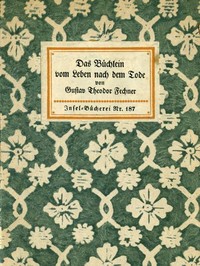Das Büchlein vom Leben nach dem Tode by Gustav Theodor Fechner
"Das Büchlein vom Leben nach dem Tode" by Gustav Theodor Fechner is a philosophical exploration written in the early 19th century. The work delves into the nature of human existence, the concept of life after death, and the relationship between the physical and the spiritual realms. Fechner proposes a nuanced understanding of life as a multi-dimensional journey, transitioning through different stages from birth to an eternal existence. The opening of the work
presents Fechner's idea that human life can be conceptualized as consisting of three stages. The first stage represents a state of ignorance and isolation, the second is characterized by social interaction and the limitations of physical existence, while the third stage signifies a higher state of awareness and connection with the divine. He likens the experience of death to a birth into this new, expansive existence, emphasizing the continuity of the soul's development. Fechner argues for a philosophy that harmonizes belief in a spiritual reality with empirical observations, suggesting that our actions in this life shape our experiences in the hereafter. This establishes a profound framework for understanding the journey of the human soul beyond death, positioning the reader to contemplate the deeper implications of existence and the nature of consciousness. (This is an automatically generated summary.)
Read or download for free
| How to read | Url | Size | |||
|---|---|---|---|---|---|
| Read now! | https://www.gutenberg.org/ebooks/44575.html.images | 122 kB | |||
| EPUB3 (E-readers incl. Send-to-Kindle) | https://www.gutenberg.org/ebooks/44575.epub3.images | 166 kB | |||
| EPUB (older E-readers) | https://www.gutenberg.org/ebooks/44575.epub.images | 166 kB | |||
| EPUB (no images, older E-readers) | https://www.gutenberg.org/ebooks/44575.epub.noimages | 111 kB | |||
| Kindle | https://www.gutenberg.org/ebooks/44575.kf8.images | 231 kB | |||
| older Kindles | https://www.gutenberg.org/ebooks/44575.kindle.images | 214 kB | |||
| Plain Text UTF-8 | https://www.gutenberg.org/ebooks/44575.txt.utf-8 | 111 kB | |||
| Download HTML (zip) | https://www.gutenberg.org/cache/epub/44575/pg44575-h.zip | 162 kB | |||
| There may be more files related to this item. | |||||
Similar Books
About this eBook
| Author | Fechner, Gustav Theodor, 1801-1887 |
|---|---|
| Title | Das Büchlein vom Leben nach dem Tode |
| Credits |
Produced by Norbert H. Langkau, Norbert Müller and the Online Distributed Proofreading Team at www.pgdp.net |
| Reading Level | Reading ease score: 56.3 (10th to 12th grade). Somewhat difficult to read. |
| Language | German |
| LoC Class | BT: Philosophy, Psychology, Religion: Christianity: Doctrinal theology, God, Christology |
| Subject | Immortality |
| Category | Text |
| EBook-No. | 44575 |
| Release Date | Jan 3, 2014 |
| Most Recently Updated | Oct 23, 2024 |
| Copyright Status | Public domain in the USA. |
| Downloads | 263 downloads in the last 30 days. |
| Project Gutenberg eBooks are always free! | |

